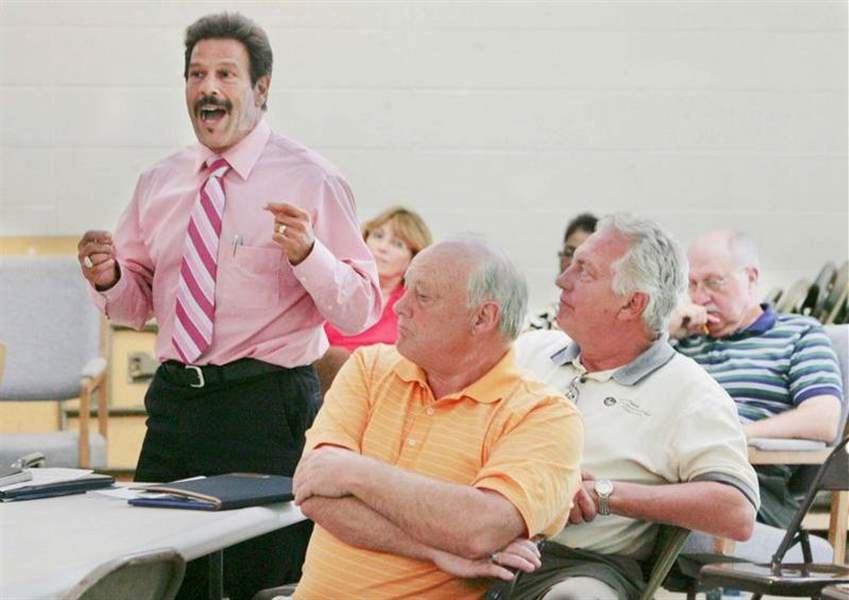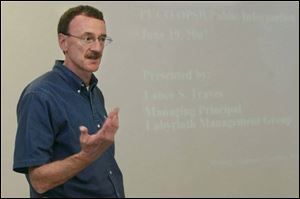
East Toledo, Oregon coking plant project told to share generated steam power
6/20/2007
Oregon Councilman Jim Seaman questions a speaker during a meeting with FDS Coke Plant officials, who outlined how steam from the coking plant could be used to generate electricity.
Mayor Carty Finkbeiner and Lucas County Commissioner Pete Gerken yesterday said they want local residents and businesses to directly benefit from any power that's generated as part of the proposed $800 million FDS Coke Plant project in East Toledo and Oregon.
They may be too late.
Lance Traves, FDS Coke Plant LLC project manager and environmental consultant, told The Blade the local officials' concern "is new to us."
He made his comment during the recess of a meeting last night at the Oregon municipal complex, where about 40 people heard the first technical details of how steam from the proposed coking plant could be captured and used to generate electricity.

But Mr. Traves said the group, which includes a consortium of unnamed investors, will not commit itself to selling the power locally or putting it on the electric grid until it finalizes the application it intends to submit to the Public Utilities Commission of Ohio and the Ohio Power Siting Board within 90 days.
FDS Coke Plant LLC is applying for a 135-megawatt power plant that would use the coking plant's steam.
Mr. Finkbeiner and Mr. Gerken, both of whom support the coking project's plans in general, issued a joint statement prior to last night's public meeting saying they are concerned "that current proposals call for the power to be placed onto the [electric] grid without any direct benefits to residents of Toledo and Lucas County."

Oregon Councilman Jim Seaman questions a speaker during a meeting with FDS Coke Plant officials, who outlined how steam from the coking plant could be used to generate electricity.
In a follow-up interview, Mr. Gerken told The Blade the decision over who gets the electricity is important because it could help the region advance efforts to provide more affordable electricity through a municipal power authority.
Toledo City Council voted in favor of creating a municipal electric utility for the city on March 28, 2006. The board's action gave the city the authority to buy and distribute electricity, in hopes it could do so cheaper than FirstEnergy Corp.
If the power goes on the electric grid, the parties that generate the electricity could be eligible for compensation from FirstEnergy under Ohio's "net-metering" law. But the electricity would not be available to a local municipal power authority.
Mr. Gerken said Toledo and Lucas County simply want to be "on the front end of this discussion, not the back end."
"We feel whoever they are owes it to us to have us at the table," he said.
Mr. Traves would not commit to a decision either way.

Traves
"There is obviously the potential for alternative power [from the plant] to be put on the grid," he said.
The coking facility could provide as many as 150 permanent jobs at average salaries of $45,000 a year.
Another 1,500 to 2,000 contractor jobs are expected to become available during the anticipated two-year construction phase.
Francis X. Lyons, the group's Chicago-based attorney, has said ground-breaking could occur this fall, although he has said the timing depends on market conditions. Gov. Ted Strickland is pushing to amend state law so that Ohio Environmental Protection Agency Director Chris Korleski could remodify the group's 2004 permit.
The proposed coking facility began as a $300 million project in 2004. Costs swelled to $500 million, $600 million, $660 million and, now, $800 million as pollution requirements and designs were modified.
Mr. Traves said last night that $100 million of the $800 million project will be for the power plant itself.
The steam-generated power facility is expected to provide 25 to 30 permanent jobs, he said.
He did not disclose the anticipated salaries for those jobs but said they will require specialized workers who will receive generous salaries and benefits.
Though the proposed coking facility straddles the Oregon-Toledo line near George Hardy Drive, all of the $100 million power plant would be in Toledo. Both the coking facility and the power plant would be built on 51 acres the Toledo-Lucas County Port Authority owns near western Lake Erie's Maumee Bay.
Unlike the coking operation, which has been mired in controversy over the levels of mercury and other pollutants that could be released, the power plant would be virtually a "zero emission" facility run off contained steam, Mr. Traves said.
A single megawatt almost produces enough power for 1,000 homes - except for summer, when usage is highest.
A 135-megawatt plant would produce enough electricity for more than 100,000 homes during nonpeak months. That's about one-fourth of the power produced by FirstEnergy Corp.'s 620-megawatt, coal-fired Bay Shore power plant in Oregon; one-seventh of the power produced by FirstEnergy's 946-megawatt Davis-Besse nuclear plant in Ottawa County, and about one-eighth of the power produced by DTE Energy's 1,100-megawatt Fermi 2 nuclear plant in Monroe County.
"It's a pretty large amount of electricity coming from a zero-emission source," he said.
Captured steam from the coking operation would be used to spin the power plant's turbines which, in turn, would generate the power.
Oregon Councilman Jim Seaman said the co-generation aspect of the project wields a big potential benefit.
"We could spin those turbines with natural gas. But we're running out of it [and have plenty of coal]," he said.
"You've got to consider clean coal at some point. Clean coal is our future," he said.
Contact Tom Henry at: thenry@theblade.com or 419-724-6079.